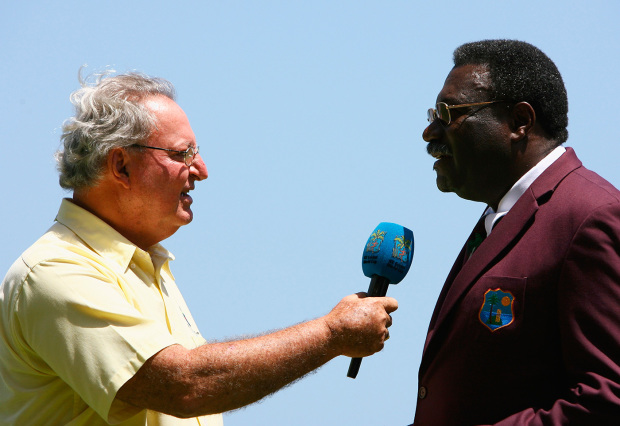Winston Anthony Lloyd Cozier

|
|||
|
Related Links
Players/Officials:
Tony Cozier
Teams:
West Indies
|
|||
COZIER, WINSTON ANTHONY LLOYD, died on May 11, aged 75. As Tony Cozier approached his half-century as an international cricket commentator, he was probably the most respected and best-loved of all the game's broadcasters. Though not a great player, he upended modern convention, and was called on regularly to work on television across the world, whether his native West Indies were playing or not. Colleagues were in awe of his ability to switch seamlessly from radio, which requires words above all, to TV, which values a certain amount of silence. Listeners just loved his voice: "A melodic lilt that brought to mind waves gently lapping on a Caribbean beach," as Mike Dickson wrote in the Daily Mail. If he was dishonoured anywhere, it was at home, where - to his great distress - his last years were clouded by disputes with West Indian administrators. There can be no question which side of the argument commanded more respect within the game.
To British listeners, Cozier sprang from nowhere when he became the visiting commentator on Test Match Special, aged just 25, in 1966. In fact, he was already a journalistic veteran. He had commentated on the 1964-65 home series against Australia; he had freelanced his way round England, sleeping in YMCAs and on friends' sofas, to cover the epic 1963 tour; long before, he had written his first professional Test report, aged 14, on the Bridgetown Test of 1954-55 for the St Lucia Voice. He did have one advantage: his father was the editor. There had been Coziers in Barbados since the late 18th century, and Jimmy Cozier made his own name as a journalist in the late imperial phase, working in several different colonies before starting his own paper in Barbados, the short-lived Daily News, then becoming an influential columnist on the Advocate. He wrote mainly on non-sporting matters, but covered West Indies' 1950 tour of England.
In Jimmy's wandering phase, Tony went to boarding school in Barbados, where he thrived, and then to study journalism at university in Ottawa, where he did not. He lasted just one long Canadian winter before coming home to play hockey (at which he represented Barbados) and club cricket (facing top fast bowlers, but not normally for long), and make his way in the world.
Various elements defined Cozier's career. There was the length and breadth of it: perhaps only Richie Benaud can have covered more international matches. Then there was his professionalism. "He was just never stumped," recalled Peter Baxter, the former producer of TMS. "He seemed to have seen and heard every game, even obscure county matches when he was on a different continent. It was as though he had been watching two games at once." There was also his commitment to Caribbean cricket: he believed passionately in its importance as a unifying factor in a splintered region and, by his popularity, became a de facto PR man for the West Indian game. For his first three decades in the business, the team were usually outstanding. As a white man from Barbados - a country with a firm racial divide before independence - he was in an unusual position; but he had established his credentials early, resigning from Bridgetown's Carlton CC after they rejected a potential black member, and joining Wanderers. He was trusted by generations of West Indies players, but his good nature and geniality also embodied all the most beguiling aspects of the Caribbean game to the outside world.
In 1966, there were reputedly letters to the BBC complaining about the employment of a "black bastard" and, in the days before his face became more widely known, he was accustomed to jaws dropping when people met him for the first time and discovered he was not black. Indeed, when in animated discussion with the players - fellow Bajans especially - that melodic lilt could mutate into a rapid-fire and, to outsiders, incomprehensible patois. His reputation as a players' man was bolstered when, reputedly at the request of the boss, he went to join Kerry Packer's commentary team during World Series Cricket. It was a good career move too, giving him a chance to break into TV.
Cozier had an extraordinary work ethic. He edited all 22 editions of the West Indies Cricket Annual between its birth in 1970 and its demise in 1991; for the next 11 years he produced the Caribbean Cricket Quarterly; he wrote a history of West Indian Test cricket, ghosted books for Garry Sobers, Clive Lloyd and Michael Holding, wrote columns for papers round the world, and contributed to Wisden regularly from 1977 to 2016. Eventually, his son Craig, now a freelance cricket producer and statistician, joined the cottage industry. Everything was done to impeccable standards. Yet there was always fun and laughter: the beach party given by Tony and his wife Jillian was a highlight of any Barbados Test.
He had to tread a difficult line amid the complex politics of Caribbean cricket. Once, he had to keep a low profile in Trinidad, having dissed the local favourite Phil Simmons. As the players became less heroic, the administrative ineptitude more blatant, and Cozier's criticisms more forceful, that task grew harder. On the 2014-15 England tour of the Caribbean, the West Indian board prevented him from doing TV commentary; their president, Dave Cameron, claimed Cozier's eyesight was failing (a slander action was still pending when he died). More objective observers thought lack of vision was indeed the problem, but not on Tony's side: he did his normal professional job for the BBC. On his death, even the board could not continue the grudge. "He represented West Indies wherever he went," they said in a statement. "He educated people around the world about our cricket, our people, our culture and who we are."

